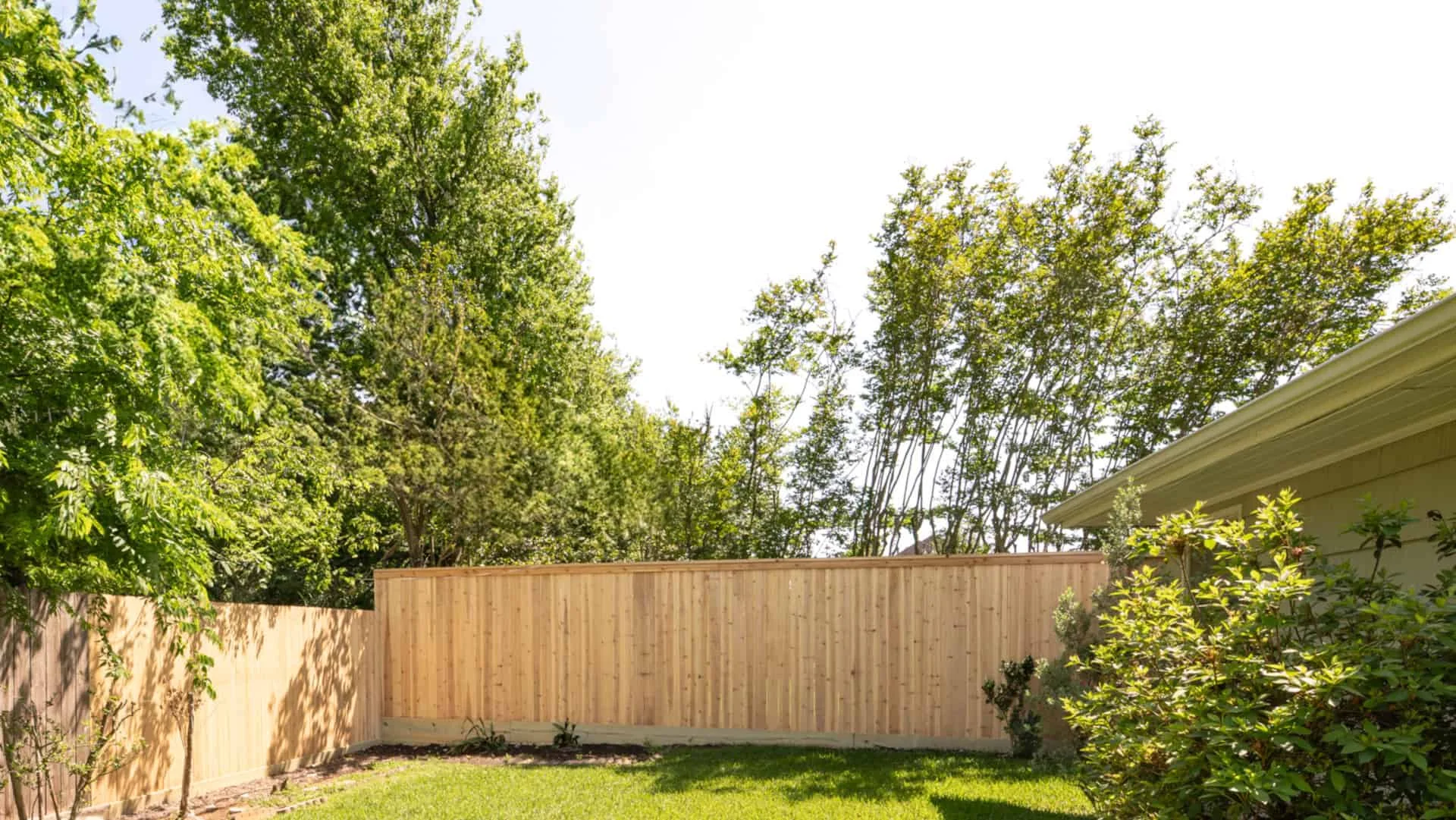Are you planning to install a fence around your property? Before contacting a fence builder, you must consider the fencing materials. Choosing the right material is essential for a durable and long-lasting fence.
For homeowners in Jacksonville, NC, this decision is even more important. That’s due to the area’s unique climate: humid summers, salty air from the nearby Atlantic Ocean, and an ever-present risk of hurricanes. You want a material that can hold up to these weather conditions so that your fence serves you long enough.
In this post, Superior Fence & Rail of Fayetteville introduces the three most popular fencing materials. These are wood, vinyl, and aluminum. We’ve weighed in on the pros and cons of each to help you make an informed choice.
Wood Fences: A Classic Charm with Natural Appeal
Key Benefits of Wooden Fences
- Appearance. Wood has a natural, classic, and timeless look that people find highly attractive for homes and farms.
- Customization. You can stain or paint a wood fence relatively easily. This ease of customization adds variety to their look and increases durability. Many styles are also available, from fortress-style to picket and split-rail fencing.
- Lower upfront cost. The lower upfront cost, compared to vinyl and aluminum, is one of the major attractions of wood fencing.
Main Disadvantages of Wooden Fences?
- Heavy on maintenance. Wood needs regular staining and sealing to maintain its charm. That’s not mentioning that you also must inspect the fence regularly for termite attacks or rot.
- Susceptible to Jacksonville’s weather. Moisture and humidity can lead to warping, particularly after storms or hurricanes. That’s why regular maintenance is a must!
- Lifespan. Wood fences typically last around 10 to 15 years. Jacksonville fence builders, like Superior Fence & Rail, often use pressure-treated wood to help combat weather damage and extend the life of the fence.
Conclusion: Wood is a great choice for homeowners looking for a beautiful, classic style on a budget. Just be ready to invest time and money in maintenance to keep it looking its best!
Vinyl Fences: Low Maintenance, Long Life
Main Benefits of Vinyl Fencing
- Durability. Vinyl doesn’t rot, rust, or fade; it’s excellent for Jacksonville’s salty air and wet weather. Plus, not only is vinyl waterproof, but ants and termites can’t destroy it either. These fences are made to last!
- Little to no maintenance. Unlike wooden fences, you won’t have to worry about staining or painting vinyl. Only occasional cleaning with water and soap is required to keep it looking new.
- Design. At Superior Fence & Rail, we have vinyl fencing materials in a variety of colors and styles. We can even customize your vinyl fence with decorative elements like lattice tops or post caps. The best part is that our HeartWood vinyl comes with a finish that mimics natural wood. So, your fence will appear wooden but with the added benefits of durability, longevity, and low maintenance.
Key Disadvantages of Vinyl Fences
- High upfront cost. Compared to wood, vinyl fencing typically has a higher initial cost, which may limit many homeowners.
- Difficult repairs. If damaged, vinyl panels often need complete replacement, not simple fixes. This can be costly and inconvenient.
Conclusion: Vinyl is a strong contender if you want a beautiful, lasting, and low-maintenance fence in Jacksonville’s climate.
Aluminum Fences: Sleek, Strong, and Coastal-Ready
Benefits of Aluminum Fences
- Strength and security. Aluminum is durable and built to resist physical impact. Sturdy picket spacing or customizable height can offer excellent security without sacrificing visibility.
- Rust-resistant. Powder-coated aluminum resists rust, making it ideal for long-term use in coastal areas like Jacksonville.
- Elegant look. Aluminum features sleek lines and customizable designs. It has this inherent ability to mimic classic wrought iron styles.
Disadvantages of Aluminum Fences
- Less privacy. Aluminum fencing typically comes in open designs. So, it’s not ideal if you’re more into privacy.
- Upfront cost. Like vinyl, aluminum fencing includes high upfront costs, especially for highly customized designs.
- Limited customization. Aluminum is not as widely customizable as wood
Conclusion: You can go for an aluminum fence for a durable, rust-resistant, low-maintenance option. And if privacy isn’t a priority.
Comparison Table: Wood vs. Vinyl vs. Aluminum
This table summarizes the comparison of vinyl, aluminum, and wood fencing materials. It makes it even easier for you to choose a material that best suits your needs.
|
Aluminum |
Vinyl |
Wood |
| Durability |
Highly durable |
Highly durable |
Moderate |
| Maintenance needs |
Low |
Low |
High |
| Privacy |
Moderate |
High |
High |
| Style options/Customization |
Moderate |
Highly customizable |
Highly customizable |
| Jacksonville’s climate resistance |
Excellent |
Good |
Fair |
Consult Your Top-Rated Fence Builder Jacksonville, NC
When choosing between vinyl, wood, or aluminum, consider what matters most. Ask yourself: is it privacy, curb appeal, or low maintenance? Remember, Jacksonville’s coastal climate plays a significant role, so durability is key. For the best results, consult a reputable fence builder in Jacksonville.
Superior Fence & Rail is your top-rated fencing company. Contact us today and speak to our experienced experts. We can recommend the best solution for your property and, when you’re ready, ensure a smooth installation process.

